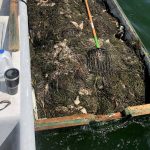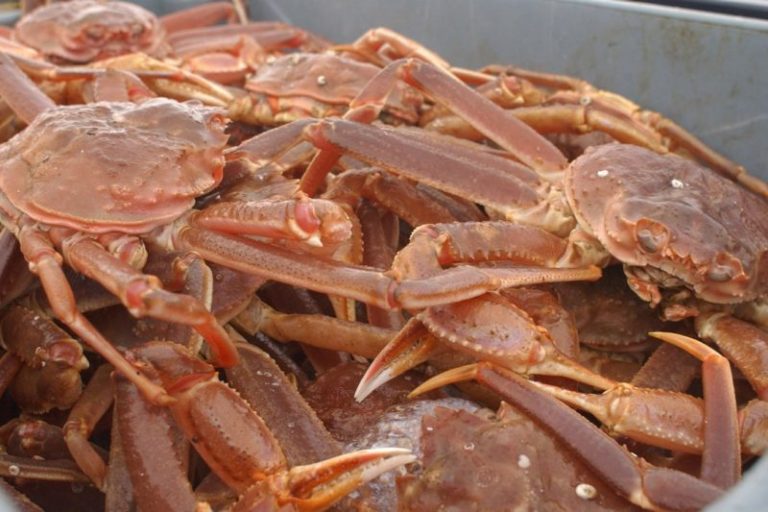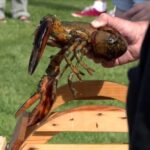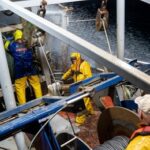Daily Archives: July 18, 2017
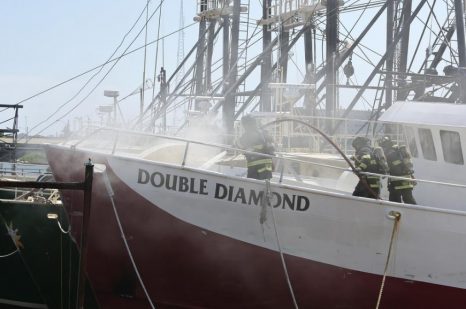
Fire in the fo’c’sle: Heavy smoke but no injuries on scallop boat in New Bedford
The bunk room of the scallop boat Double Diamond caught fire on Leonard’s Wharf Tuesday afternoon, probably from welding, firefighters said. No one was injured. Smoke was coming from the vessel’s interior when New Bedford firefighters arrived, according to District Chief Steven Beaulieu, the incident commander. “There was heavy smoke pouring out of the back hatch, just below the pilot house,” he told The Standard-Times. “We had heavy smoke pouring from the forward vent on the fo’c’sle. The guys advanced lines. We had talked to the workers. They were working forward doing welding operations, and something must have started.” The fire was reported around 2 p.m. Maurice Lemieux of Dartmouth owns the 84-foot scalloper; click here to read the story 21:52
Oversight Hearing “Exploring the Successes and Challenges of the Magnuson-Stevens Act” Wednesday, July 19, 2017 2:00 PM
 On Wednesday, July 19, 2017, at 2:00 p.m., in Room 1324 Longworth House Office Building, the Subcommittee on Water, Power and Oceans will hold an oversight hearing titled “Exploring the Successes and Challenges of the Magnuson-Stevens Act.” Witnesses are Mr. Jeff Kaelin, Government Relations, Lund’s Fisheries, Inc. Cape May, New Jersey. Mr. Sean Martin, President, Hawaii Longline Association, Honolulu, Hawaii. Mr. Nick Wiley, Executive Director, Florida Fish and Wildlife Conservation Commission, Tallahassee, Florida. Mr. Charles Witek, Recreational Angler and Outdoor Writer, West Babylon, New York. click here at 14:00 Wednesday to watch the proceeding. If you need further information, please contact Calvin Frauenfelder, Clerk, Subcommittee on Water, Power and Oceans at (202) 225-8331.
On Wednesday, July 19, 2017, at 2:00 p.m., in Room 1324 Longworth House Office Building, the Subcommittee on Water, Power and Oceans will hold an oversight hearing titled “Exploring the Successes and Challenges of the Magnuson-Stevens Act.” Witnesses are Mr. Jeff Kaelin, Government Relations, Lund’s Fisheries, Inc. Cape May, New Jersey. Mr. Sean Martin, President, Hawaii Longline Association, Honolulu, Hawaii. Mr. Nick Wiley, Executive Director, Florida Fish and Wildlife Conservation Commission, Tallahassee, Florida. Mr. Charles Witek, Recreational Angler and Outdoor Writer, West Babylon, New York. click here at 14:00 Wednesday to watch the proceeding. If you need further information, please contact Calvin Frauenfelder, Clerk, Subcommittee on Water, Power and Oceans at (202) 225-8331.
Hearing Memorandum details, click here 19:35
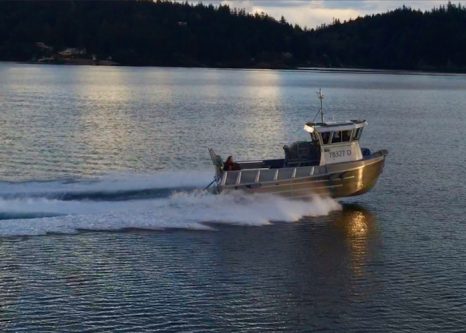
Built by fishermen for fishermen
Tom Aliotti’s new Bristol Bay gillnetter ‘Mariola’ did 36 knots on sea trials. Asked the secret of getting that speed, he replied, ‘I’m not going to tell you my secret,’ he said, when asked how that speed is achieved. “Except that I have fished Bristol Bay for 33 years and I use that knowledge to build boats for fishermen.” Staying within the legally prescribed 32 foot (9.75m) limit for Bristol Bay gillnet boats creates a challenge that eager designers like Tom Aliotti are happy to take on, reports Alan Haig-Brown. click here to read the story 17:42
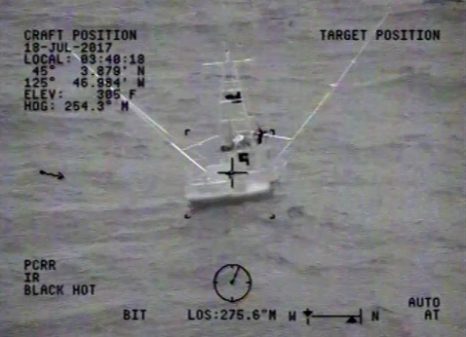
Coast Guard medevacs ill fisherman 75 miles off Lincoln City, Oregon
An aircrew aboard an MH-60 Jayhawk helicopter from Coast Guard Sector Columbia River conducts a medical evacuation of an ill fisherman 75 miles offshore of Lincoln City, Ore., July 18, 2017. The Coast Guard medevaced the fisherman off the commercial fishing vessel Kandi Dawn 75 miles offshore of Lincoln City, Oregon, early Tuesday morning. The aircrew safely hoisted the fisherman suffering from symptoms related to a heart attack and delivered the patient to the Level 1 Trauma Center at Oregon Health and Science University in Portland. Watchstanders at Coast Guard Sector North Bend received the call for help from the captain of the fishing vessel Kandi Dawn at 1:30 a.m. and requested support from the Sector Columbia River aircrew and its long-range asset at 2 a.m. The Jayhawk aircrew arrived on scene with the vessel and patient at 3:41 a.m. and safely hoisted and transferred the patient to OHSU for further care at 5:50 a.m. click here for video 16:27
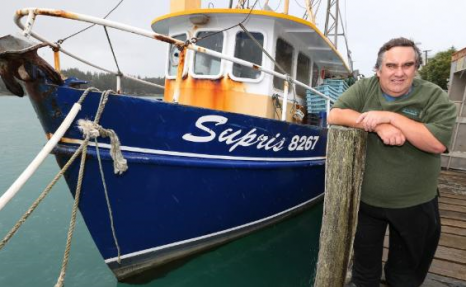
Electronic Monitoring – New fishing regulations bring opposition in Southland
Some southern fishermen say new government regulations for commercial fishing boats could be put small operators out of business. From October 6, new measures will be rolled in to ensure that all commercial fishing boats are fitted with both GPS equipment and cameras, to improve monitoring of catch levels and to help prevent any illegal activity. Primary Industries Minister Nathan Guy said the changes would protect the sustainability of New Zealand’s fisheries, and “give us arguably the most transparent and accountable commercial fishery anywhere in the world”. However, some southern fishermen fear the new rules could also bring about a range of negative consequences. As well as the costs incurred from buying and maintaining the new equipment, it could also inadvertently reveal many fishermen’s jealously guarded marks (fishing spots). click here to read the story 15:59
The EU is making poor countries poorer
 The EU likes to present itself as a global force for good, fostering aid and development in the world’s poorest societies. It boasts of its £12 billion aid programme, and calls itself “the most generous donor in the world”. It truly believes itself to be a kindlier world power than the United States, Russia, or China. As ever with the EU, the truth is much uglier. Eurosceptics have long known of the EU’s practice of dumping subsidised agricultural products on developing countries, especially Africa. In a rare case of progress, the EU now spends considerably less on these, and WTO members – including the EU – finally agreed to end export subsidies in 2015.,,, The EU also harms local fishing industries. Having instituted rigorous fishing quotas in Europe, the EU makes deals with various West African countries to allow its large trawlers to fish on a massive scale in those countries’ waters. click here to read the story 13:36
The EU likes to present itself as a global force for good, fostering aid and development in the world’s poorest societies. It boasts of its £12 billion aid programme, and calls itself “the most generous donor in the world”. It truly believes itself to be a kindlier world power than the United States, Russia, or China. As ever with the EU, the truth is much uglier. Eurosceptics have long known of the EU’s practice of dumping subsidised agricultural products on developing countries, especially Africa. In a rare case of progress, the EU now spends considerably less on these, and WTO members – including the EU – finally agreed to end export subsidies in 2015.,,, The EU also harms local fishing industries. Having instituted rigorous fishing quotas in Europe, the EU makes deals with various West African countries to allow its large trawlers to fish on a massive scale in those countries’ waters. click here to read the story 13:36
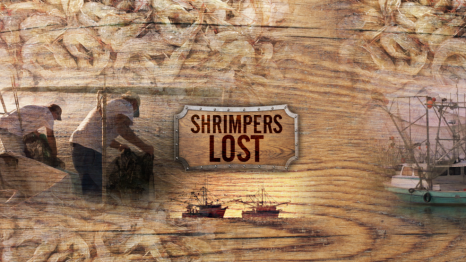
Shrimpers Lost
Today we’re going shrimping in Venice, Louisiana. Acy Cooper is our guide. Sharyl: How important is the shrimping business to your personally? Acy Cooper: It’s everything to me. You know, my family does it. My dad’s 80 years old, he still fishes. And my two boys has entered the business, and my daughter she married a fisherman. Louisiana’s shrimp industry has been a family affair for more than a century.,, Now my sons and all they starting to struggle now, because of what’s going on. He’s talking about foreign shrimp flooding the market from places China, Indonesia, Vietnam and Thailand. The U.S. has become a massive importer of a resource we have right here at home. About 94% of the shrimp we eat comes from abroad, selling for a fraction of the price of the ones caught at home. There’s no getting around it: The US shrimping industry is dying. click here to read the story 13:01

Denny Hamlin freaked out by 22-lb live lobster after winning New Hampshire NASCAR race
Like many NASCAR tracks, New Hampshire Motor Speedway has a distinct tradition where it rewards winning drivers with a prize representative of that particular region. Similar to how the trophy at Auto Club Speedway in Southern California includes a surfboard, or Texas Motor Speedway a cowboy boot. What awaited the winner of Sunday’s Cup Series race at New Hampshire was a 22-pound live lobster. A prize race-winner Denny Hamlin wanted no part of as he fled when crew chief Mike Wheeler tried to hand Loudon the Lobster to him in victory lane. Hamlin did overcome his fear briefly to take a few photographs with the crustacean. click here to read the story 12:04
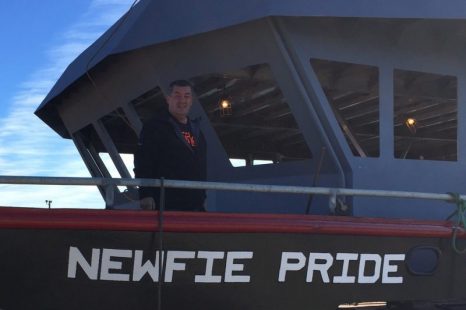
Despite cutbacks and an extended crab fishery, shrimp harvesters still making their way
With increased uncertainty for the industry, shrimp fishermen along the Northern Peninsula are still working hard and hoping for the best in the midst of another season. Anchor Point fisherman Roland Genge says Shrimp Fishing Area (SFA) 8 has supplied his boat with roughly 800-1000 pounds per hour, and in areas like Port Harbour, it can be found all over the ground. “Boats are spread right out and getting pretty much the same amount of catch right on through,” Genge said.,, With biomass declining and quota cuts causing mass grievance among fishermen across the island, Genge says the fears and anxieties surrounding the shrimp populations are not to be found where he’s been casting nets. The shrimp population appears as plentiful as ever. click here to read the story 09:35
Rural America Keeps Rejecting Big Wind
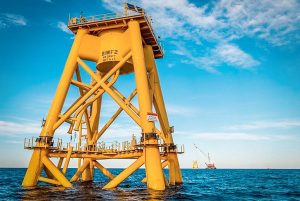 The backlash against Big Wind continues. Indeed, entire states are now restricting or rejecting wind projects.,,, The backlash is so fierce that Big Wind has begun suing small towns to force them to accept wind projects. Since last October, NextEra Energy, the world’s biggest producer of wind energy, has filed lawsuits in federal and state courts against five rural governments, including the town of Hinton, Oklahoma, population: 3,000. NextEra is funding its courthouse mugging of small-town America with your tax dollars.,,, The backlash is happening offshore, too. In New York, the Long Island Commercial Fishing Association and a boatload of fishermen and fishmongers have filed a federal lawsuit to prevent a wind project from being built on top of one of best squid and scallop fisheries on the Eastern Seaboard. click here to read the story 08:56
The backlash against Big Wind continues. Indeed, entire states are now restricting or rejecting wind projects.,,, The backlash is so fierce that Big Wind has begun suing small towns to force them to accept wind projects. Since last October, NextEra Energy, the world’s biggest producer of wind energy, has filed lawsuits in federal and state courts against five rural governments, including the town of Hinton, Oklahoma, population: 3,000. NextEra is funding its courthouse mugging of small-town America with your tax dollars.,,, The backlash is happening offshore, too. In New York, the Long Island Commercial Fishing Association and a boatload of fishermen and fishmongers have filed a federal lawsuit to prevent a wind project from being built on top of one of best squid and scallop fisheries on the Eastern Seaboard. click here to read the story 08:56
Temporary closure of a fishery can help whales and fishermen, biologist says
 As right whale researchers shift their focus to the Gulf of St. Lawrence, they welcome a decision by the federal government to close a snow crab fishery early after seven whales and a whale rescuer died. Sean Brillant, a senior conservation biologist with the Canadian Wildlife Federation based in Halifax, said he recently proposed a similar strategy to protect right whales that would restrict fishing during the summer in the Grand Manan Basin in the Bay of Fundy and the Roseway Basin on the Scotian Shelf. Brillant said said fishermen’s landings have reportedly declined in recent years, so the impact on them would be minimal. click here to read the story 08:13
As right whale researchers shift their focus to the Gulf of St. Lawrence, they welcome a decision by the federal government to close a snow crab fishery early after seven whales and a whale rescuer died. Sean Brillant, a senior conservation biologist with the Canadian Wildlife Federation based in Halifax, said he recently proposed a similar strategy to protect right whales that would restrict fishing during the summer in the Grand Manan Basin in the Bay of Fundy and the Roseway Basin on the Scotian Shelf. Brillant said said fishermen’s landings have reportedly declined in recent years, so the impact on them would be minimal. click here to read the story 08:13

































